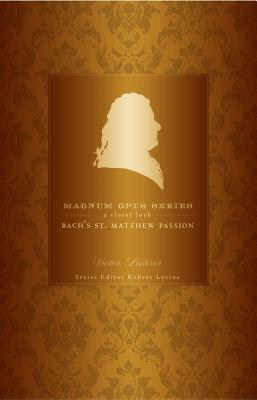
“Bach, of course, was a devout Lutheran at a time when that faith was experiencing profound changes from within. The Pietist movement, a reformation within this reformed church, was changing the manner of Lutheran worship. The effect of Pietism on Bach’s life and religious music is immeasurable. The texts of his church cantatas and the two surviving Passions, strongly Pietist in spirit, are full of meditative intensity and high-strung, often morbid imagery — not unlike many opera libretti. These texts stimulated Bach’s ready imagination to some of its greatest peaks. The tortured intricacy of Bach’s melodies, as they restlessly rise, fall, turn, twist, break, stop, then struggle back into motion, reflect the composer’s obsessive need to capture the slightest nuance of meaning of every word he set. As Leo Schrade, in his short but fine study, Bach: The Conflict between the Sacred and the Secular, observes:
Bach did not allow Pietism to make itself much felt in his external life. But he admitted that it exerted its influence upon his religious ideas of art. And here, indeed, Pietism was of far-reaching consequence. For the Pietist religious intensity came from his attitude toward the evangelical word of the Bible; he discarded the dogmatic meaning which tradition had honored. He devoted himself to the direct meaning of the word. He believed that intimate and spiritual conversation with God will reveal the true and pious sense of the word. He must endeavor to exhaust the inherent secrets of the word in order to find God through it.
“Early Lutheran hymns, sung by the congregations, use the German plural pronouns wir (we) and unser (our), meaning ‘we, the congregation’ implicitly embracing the wider community of believers as well. A number of the old chorales Bach used in the St. Matthew Passion employ the first-person plural, including the three crucial choruses that are the work’s main landmarks. These pronouns represent an immense, unbridgeable split with the Roman Catholic liturgy, effectively demoting the priest-celebrant from his lead role in the drama of the Mass. With this, the role of the church itself, with all its dogma and hierarchies, was also questioned and ultimately reduced. Another massive shift in the practice of Christian worship brought about by Luther and his followers was to hold the service in the vernacular, so that it might be understood rather than veiled in the mystery of Latin.
“Bach and his librettists for the Passions and the cantatas took matters a step further, emphasizing Pietistic belief in the individual’s direct connection, through prayer and meditation, to God. Henrici’s lyrics for every aria but one in the St. Matthew Passion are in first-person singular: the singer, representing the human soul, sinful by nature but strong in faith, sings as ich — I. The St. John Passion of three years earlier presents a similar pattern, as do many of the surviving church cantatas. What Bach and his librettists (including one female writer) sought to portray was the soul reflecting with feeling on an aspect of God, be it the terrible suffering of Jesus, or on his mercy, or on the divine glory.”
— from Victor Lederer, Bach’s St. Matthew Passion: A Closer Look (Continuum, 2008)